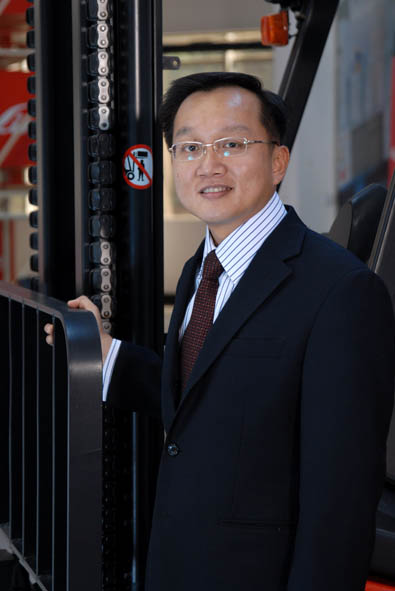 Chingpong (CP) Quek |
By Paris Lord
Chingpong Quek likes to squeeze as much time as possible out of life.
Whether running Linde's Chinese operations, travelling to meet clients as part of Linde's Asia arm, or playing with his young family, Quek maximises his minutes.
The former mechanical engineer has been chief executive of Linde (China) Forklift Truck Corp Ltd for over two years.
Previously, Quek spent a decade with General Electric and three years with Eaton Corporation.
He relishes being part of a busy company and seeing how forklifts are part of modern life, be it at supermarkets or ports.
The Chinese forklift industry has experienced a number of alterations in the past two years. When Quek joined Linde in early 2006, China was the world's third-largest market by output, behind Japan and leader the United States. Today, China is second and continues to narrow the gap.
"It's been growing an average 30% per annum," Quek tells
Forkliftaction.com News from the Linde (China) base in the south-eastern city of Xiamen.
Secondly, land costs are increasing, especially in China's more developed coastal areas. As the movement of goods quickens, that requires more warehouses, and taller ones given the rising land prices.
"Being higher, coupled with narrower aisles means more complex material handling solutions are required," Quek notes.
As a result, the warehouse truck segment and system solutions are growing rapidly.
A third change is China's new labour law which puts pressure on companies to maximise efficiencies from employees.
On a domestic and worldwide scale, there's also a trend toward lower emissions.
"Foreign and local forklift players really have to pay attention to this," Quek says.
"Linde, I believe, is a front-runner. Our diesel truck engines are Euro stage III compliant, which is the most advanced."
Quek has noticed more competition, not only from the major international forklift names which operate in China. "There are so many new emerging brands. Even a lot of new companies which may not have done forklifts, but say, construction equipment, are in this business now."
There is "no typical day" for Quek. One third of his time is spent with customers.
The next is with employees, such as coaching them. The last third is strategic management, such as business and operational reviews.
Quek spends more than half his time travelling, meeting customers, suppliers and employees. "I always believe in face-to-face meetings," he says, adding that travelling is not a burden.
"Of course, you can do conference calls, email and so on, but I still believe a lot of communication can be more effective if you see eye-to-eye," he notes. "Only when we meet customers, suppliers and employees, they are the ones who tell you what needs to be done. That's where you get the best information."
Asked to describe his management approach, Quek says one aspect of it is similar to an old Chinese coin with a square hole in the centre: "You have to have a hard core," he explains. "To me the square in the old coin is the core. Be it our core value of the company or our core strategy, that is something we won't change.
"But the round part, the outside, [is] what we call situational management. That means there is no one fix-all formula. You've got to maintain flexibility and at the same time, not divert from your core."
Quek relaxes by being with his wife and young children, aged five and 10. He concedes that he may not be with his son and daughter as much as he wants.
"Any time that I can squeeze out of my work, I will spend time with them, teaching my children the value of life," he says. "If I don't have enough time to play with them, I've got to take the precious time that I have and really educate them in a fun manner."
Other relaxations include reading, team activities and food.
"I enjoy travelling to different places and eating things that the local people are eating," Quek says.